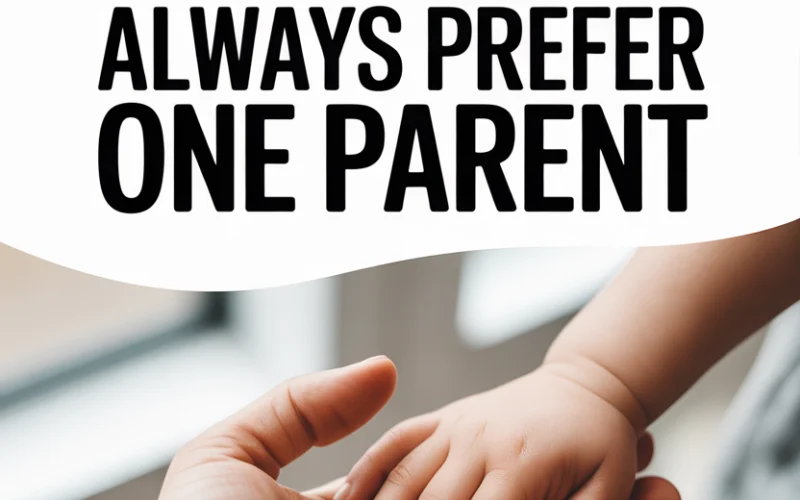Parents who’ve ever had a child shriek, “I want Mummy!” (while Daddy stands helplessly holding a half-peeled banana) know the sting.
It’s never personal—except it sort of feels that way when you’re the rejected party, left holding your dignity and a snack no one wants.
Let’s dig into why some children pick sides, how to handle being the favourite or the not-so-favourite, and ways to help everyone feel loved.
Spoiler: it’s pretty common, usually temporary, and almost never means you’re doing it wrong.
Attachment: The Early Days Set the Tone
From day dot, babies learn who’s most likely to answer their cries for milk, warmth, or that 3am existential crisis. The parent who’s often on nappy duty might become the “go-to” for comfort.
This isn’t a mark of superior parenting—just proximity, smell, and the magical ability to locate lost dummies at 2am.
Attachment theory explains a lot of this behaviour. Children naturally form a primary bond with the person who responds most reliably to their needs, according to Bowlby’s original research.
If that’s you, congratulations: you’re officially the person who can never pee alone. If it’s not you, there’s hope (and the possibility of solo toilet trips).
Personality and Preference: Tiny Humans, Big Opinions
Some children are born with the decisiveness of a CEO in a boardroom. They just know who they want for cuddles, stories, or applying sticky plasters.
Personality plays a huge part. An energetic, rough-and-tumble parent might be the apple of one child’s eye, while another leans toward the quieter, more patient grown-up.
It’s not about who’s more fun or who hands out more biscuits. Children gravitate toward the parent whose temperament matches their needs in the moment.
A sensitive child might crave extra reassurance from the gentler parent, while a thrill-seeker wants someone who’ll play superhero for the tenth time this morning.
Routine: The Comfort of Predictability
Children love routines. (Spontaneity? Not so much.) If one parent does bedtime stories, school drop-off, or pancake Saturdays, that parent can become the default for those moments.
Routine gives kids a sense of security. If Dad reads the bedtime book 99% of the time, don’t be shocked when Mum’s attempt to do it “her way” is met with a five-alarm meltdown.
Kids are connoisseurs of the familiar, and change—even as minor as a different voice reading “The Gruffalo”—can be cause for protest.
Transitions and Big Changes: The Parent as Safe Harbour
New sibling? New house? Change in routine? Children often react by clinging fiercely to one parent, seeking stability.
Think of it as an emotional security blanket—except the blanket is alive, possibly caffeinated, and just trying to get through the day.
Big transitions can make children anxious, which fuels more one-parent preference. Research from the Child Mind Institute shows this is a normal part of emotional development.
The good news: it usually passes as routines settle and kids adjust.
Developmental Stages Bring Shifting Loyalties
At age two, your child might treat you like the sun rises and sets because you know how to cut toast “the right way.” By age five, you’re out and the other parent is in—sometimes for reasons as arbitrary as who can do the best dinosaur voice.
Loyalty shifts are a normal part of growing up. In early years, children test boundaries, learn about independence, and cycle through alliances faster than a reality TV cast.
Tomorrow’s favourite parent could be today’s afterthought.
What About Parental Availability?
Work schedules, travel, and “life stuff” often mean one parent is more present. If Mum works late and Dad does dinner, bedtime, and the emergency sock hunt, Dad may become the default for comfort and requests.
Absence doesn’t breed fondness in toddlers—it breeds confusion, and occasionally, a dramatic rejection scene worthy of amateur theatre.
The parent who’s around more often will see more affection, but also more tantrums. Lucky you.
Handling the Heartache When You’re Not the Favourite
Few things sting like your child howling for your partner while you’re trying to offer love (or snacks, or both). It’s okay to feel hurt—parenting is not for the thin-skinned.
Try not to take it personally. Remember: children aren’t evaluating your worth as a parent, just expressing a fleeting preference.
Forcing affection rarely works, and only makes you feel rejected twice over.
Instead, find low-pressure ways to connect. Offer to join their play, invite them for a cuddle during their favourite show, or simply be present without demanding attention.
Sometimes, being quietly reliable does the trick.
If You’re the Chosen One: Surviving the Smother-Love
To the parent being followed into the loo, called back for “one more kiss,” and used as a human climbing frame—solidarity. The attention is flattering, but it can also be overwhelming.
Boundaries matter. It’s healthy (and necessary) to say, “I need two minutes to myself” or to encourage your child to spend time with the other parent. Guilt is not required here.
It’s good for kids to learn that love isn’t measured by constant proximity, and that all parents have something valuable to offer.
Strategies for Balancing the Parental Scales
If your family dynamic has a clear “favourite,” you can gently encourage more balance.
Swap some routines. If Mum usually handles bath time, try handing over the bubble wand to Dad. The first few nights may involve protests, but consistency pays off.
Make family time a must. Shared activities—storytime, movie night, building the wobbliest tower imaginable—help kids associate both parents with comfort and fun.
It’s tempting to “compete” for favourite status. Resist. The goal isn’t to win, but to make sure your child trusts both parents with their needs.
If you notice that one parent always deals with the tough stuff (nappy changes, discipline) while the other gets the giggles and treats, try to even out the roles. Nobody wants to be the family baddie forever.
When to Worry (Spoiler: Rarely)
Persistent rejection of one parent can be tough, but it’s rarely a sign of anything serious.
Exceptions exist—if your child shows extreme distress, suddenly withdraws, or their preferences are causing significant family upheaval, it’s worth checking in with a paediatrician or a child psychologist.
But, in most cases, those cries for “only Daddy” or “only Mummy” are just a passing phase—one of many your child will cycle through before adolescence, when they’ll probably decide neither of you understands anything.
Sibling Dynamics and Parent Preference
If you have more than one child, you may notice alliances forming. Sometimes, one child favours Mum, the other Dad—balance achieved, right? Not always.
Sibling rivalry can play a part, with children vying for attention by playing parents off against each other.
Stay consistent. Don’t let yourself become the “fun parent” or the “rule parent.” Kids thrive when both parents are present, engaged, and not secretly plotting to swap roles.
The Power of “Good Enough” Parenting
Breathe. No child’s love is perfectly distributed. “Good enough” parenting—showing up, loving them, and occasionally getting their favourite cup—is more than enough.
Even if you get the cold shoulder now and then, you’re building a foundation of security.
For the rejected parent: your day will come. For the chosen one: invest in noise-cancelling headphones (just a suggestion).
What Really Matters
Parental preference feels personal, but it’s a normal part of your child’s emotional development. Kids learn about trust, comfort, and love by trying on different relationships.
Some seasons, you’ll be the preferred port in the storm; other times, you’ll be waving from the sidelines.
What counts most? Being there, loving them, and never, ever underestimating the restorative power of a cup of tea (for you, not them).
And if all else fails—there’s always the dog.




